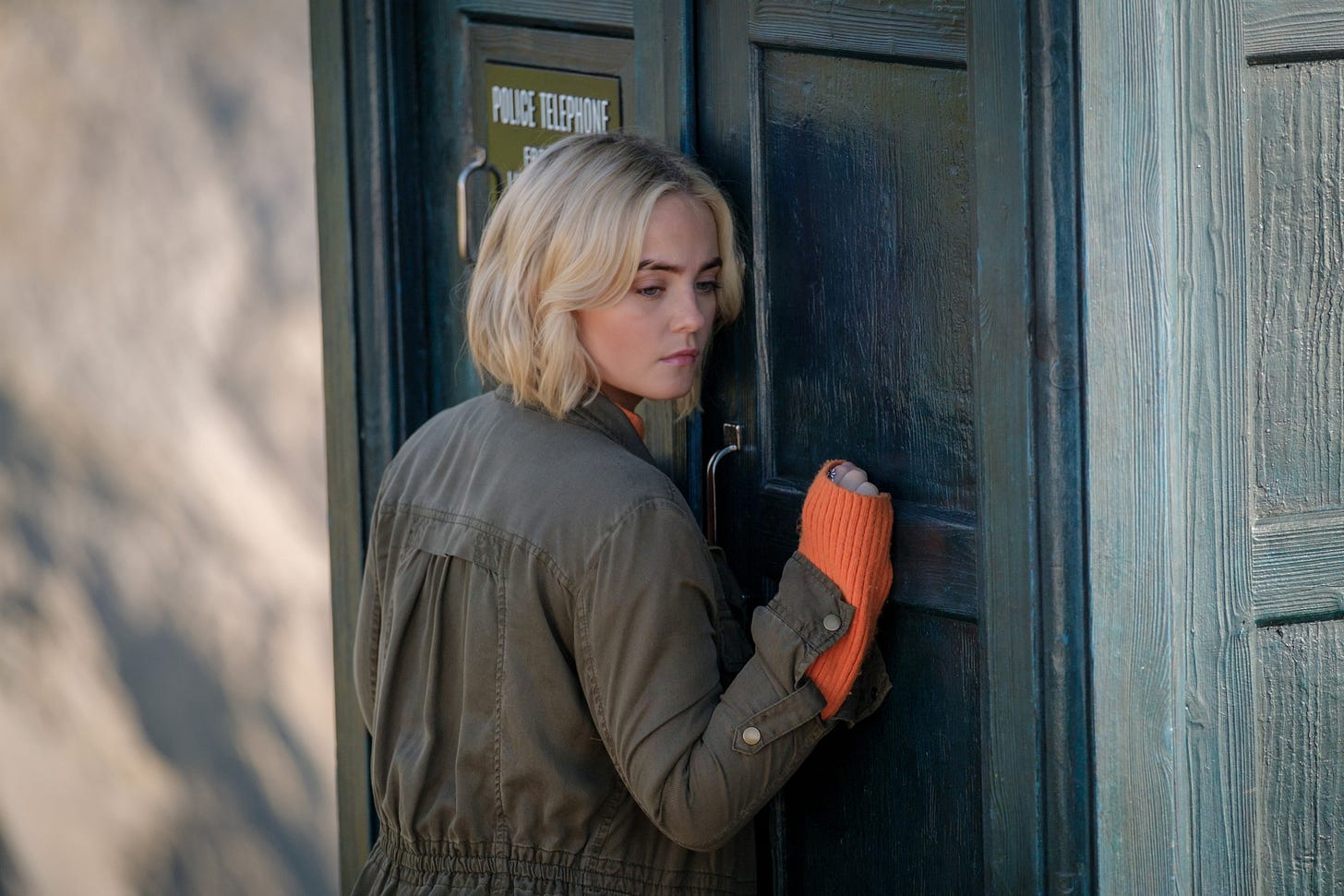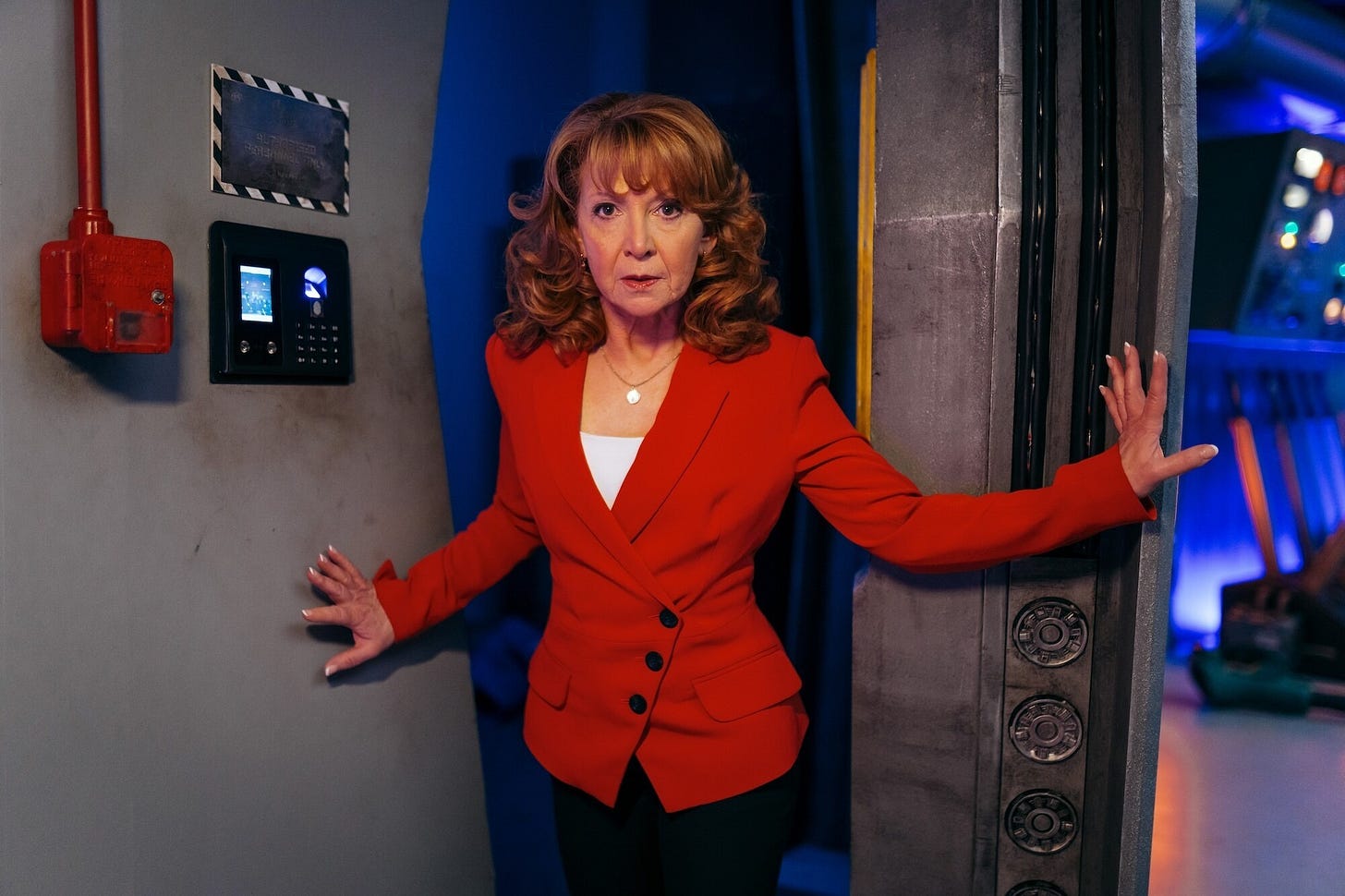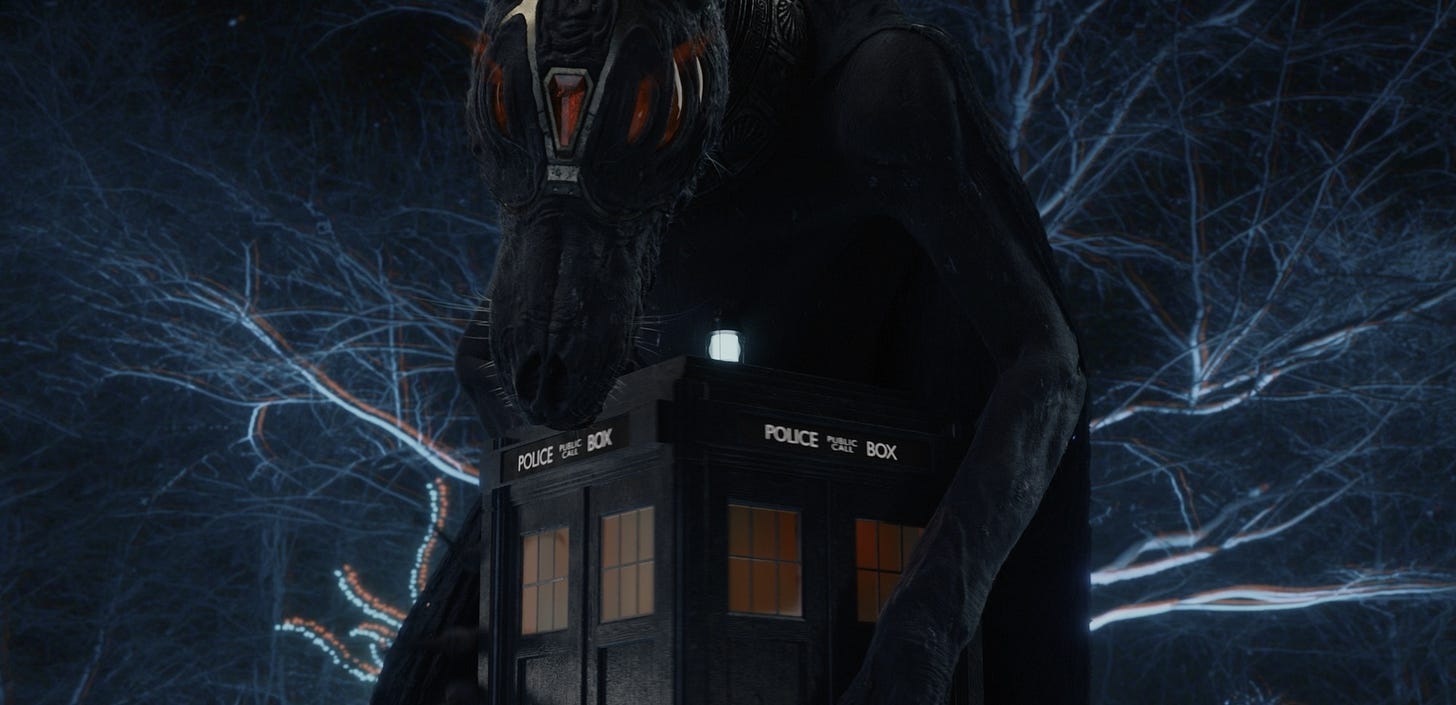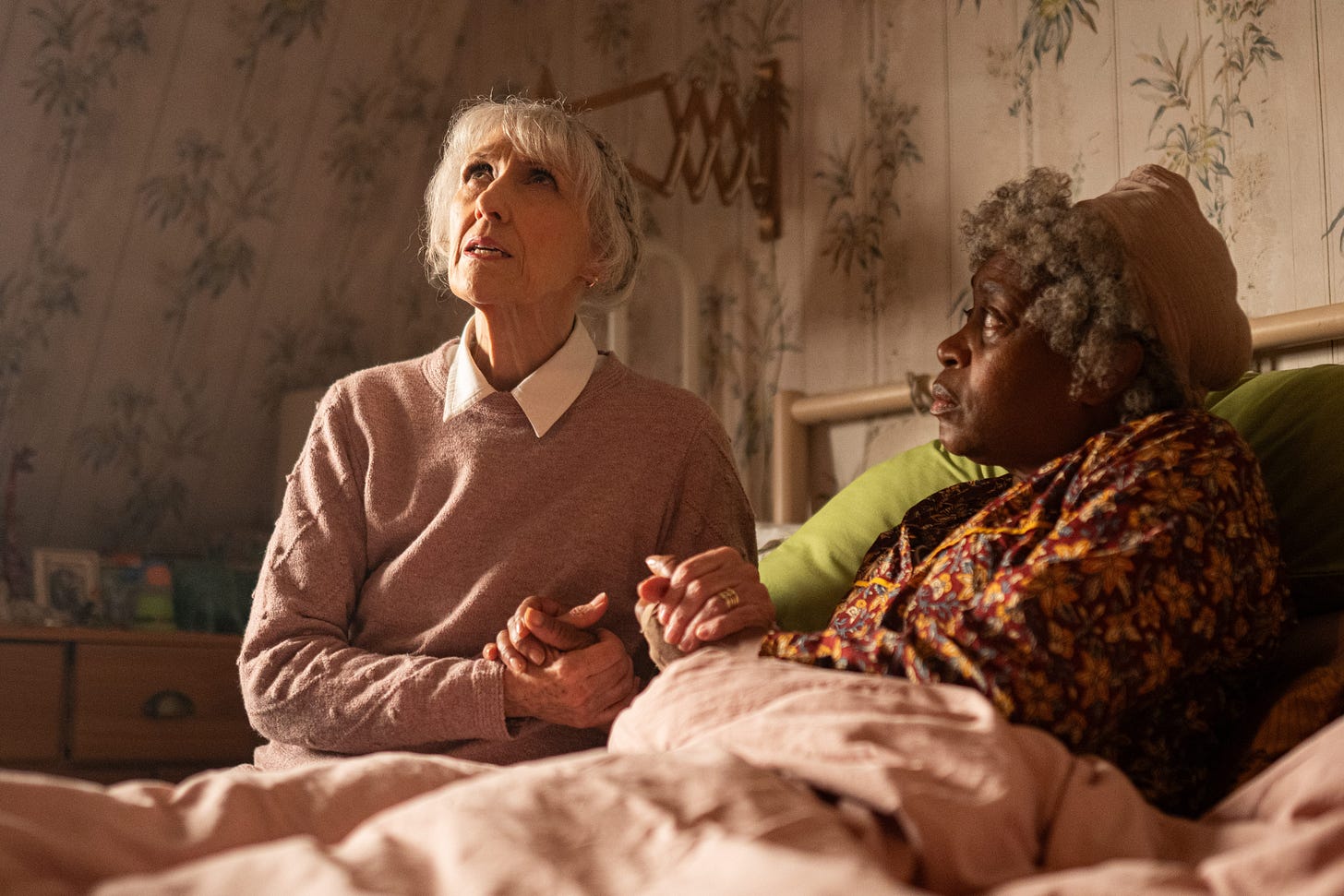5 Thoughts on Doctor Who Season 1, Fan Q&A, plus an Update
The biggest takeaways from Ncuti Gatwa's first season as the Doctor.

It’s been over a week since Sutekh brought “death to death” in probably the biggest of Russell T. Davis’ big red reset buttons to date. We got answers to many questions, thought of a few more, and then said goodbye to Millie Gibson as Ruby Sunday… for the first time.
Chris and I shared our immediate thoughts on the story in our Hot Take on Empire of Death the night of the broadcast. I won’t rehash those here, but instead I’d like to share a few thoughts that have been percolating on the first season of the Gatwa Era since we probably won’t be doing a full S1 wrap-up for a while, given our summer schedules.
We’ve also got a Q&A with a fan of the podcast who emailed us a set of questions earlier in the season. We don’t ordinarily publish that kind of thing, but the person’s questions were so thoughtful that we asked if we could publish them, and the person said yes. Let us know if you like it — it could be the first of many!
Before I get started on that, we know we’ve been a bit neglectful of this website and newsletter. We’re working on it. Our podcast editing and publishing is still such a manual process that it sucks pretty much all the time we have to dedicate to Pull To Open. However, we like the written word, too, so we’re doing our best to build in more habits that include Substack. And perhaps more someday.
OK, on with those thoughts on… um… *checks notes*… Doctor Who!
All Killer No Filler
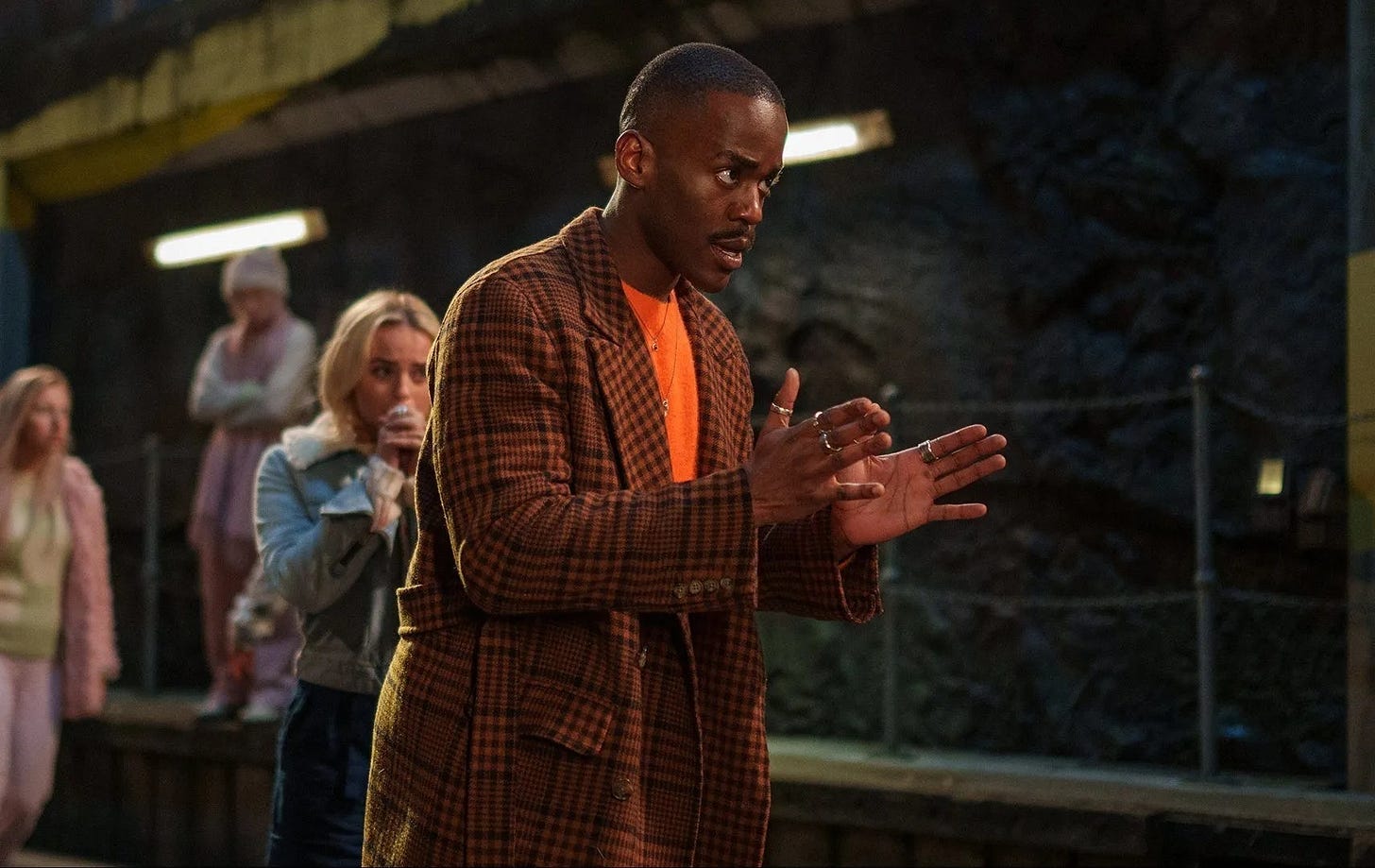
Image via The Black Archive It seems that, for the forseable future, Doctor Who seasons will be short. That’s not the best development, but RTD and his team made sure not to squander the opportunity. Every episode, with maybe the exception of Space Babies, felt epic. The Maestro was part of the Pantheon. Boom had Moffat and future companion Varada Sethu, not to mention visceral stakes that were sky-high. 73 Yards was the most engaging “Doctor Lite” episode since Blink. Dot and Bubble had the most-talked-about twist of the season. Rogue pushed Doctor Who into further into queer culture than ever before. And the two-part finale combined elements from classic and modern Who to tell a story that killed everyone in the universe in the first act! Some episodes worked better than others, but respect for RTD for swinging for the fences every time.
Millie Gibson Is the Breakout Star
This is Ncuti Gatwa’s show, but holy cow is Millie Gibson incredible. In story after story, Gibson was called upon to find emotions that weren’t just deep, but highly unique. Think about her perfomance in 73 Yards, an episode she must carry from start to finish: She’s got to first show the fear and despair of having someone “haunt” her and not be able to get anyone to help, but she also has to portray someone who’s lived with the haunting all her life, and how that would affect everyday interactions. She delivered the right amonts of wonder and anguish in Boom, and her performance when Ruby meets her mother in the season finale is nothing short of spectacular. It’s a good thing she’s back for Season 2 — her talent and energy would be hard to do without.
It’s Not ‘Doctor Who: Year 1’
In the early talk of preproduction of this season, RTD said something along the lines of getting going with new adventures with Ncuti Gatwa’s Doctor, and not dwelling much on the past. That turned out to be some kind of mislead, since the season was utterly littered with references to previous seasons — even the original “Season 1” when the Doctor tells Ruby he’s living with his granddaughter in 1963. You also had Kate Stewart and UNIT, a direct callback to the Anglican priest-soldiers from Series 5, and of course that finale. Longtime fans eat this stuff up, but it all makes you wonder if new audiences on Disney+ are starting to think the show is a little impenetrable.
RTD Is Uninhibited
Russell T. Davies’ first run on the show certainly had plenty of reset buttons and nostalgia, but he seemed to understand that hand-waving was made more palatable when you at least acknowledged you were hand-waving. That instinct appears to have faded, if the resolution to the finale is any indication. After establishing Sutekh’s extreme power, the Doctor simply getting him to touch the “skin” of the time vortex to restore the universe… it’s beyond a stretch. We get where you want to go — we even support it — but it still needs to be earned with story and dialogue. It appears RTD doesn’t feel the need to be quite so careful anymore.
Mrs. Flood and Breaking the Fourth Wall
The character of Mrs. Flood had one of the most cringeworthy lines of dialogue in The Church on Ruby Road, but at least it seemed to be leading somewhere. And it was, with her doing a kind of Mary Poppins-but-in-Romana’s-outfit scene at the end of the finale. Certainly more is to come in Season 2 and possibly even 3, but these moments where characters in the show seem to know they’re in a show are a dicey experiment for a series that’s ultimately episodic. Even if it does end up adding up to an interesting meta storyline, it may not justify the confusion for new fans just trying the show for the first time.
Fan Q&A With Jenny M.
Jenny emailed us these questions mid-season, and we replied to her and asked permission to republish her questions and the answers. Let us know if you like this feature, and we’ll do more of them: pulltoopenpodcast@gmail.com
Do you get the sense that the 60th anniversary specials were a tribute to the 10th Doctor era as opposed to the whole show?
Not so much the era, but Series 4, which most fans agree is possibly the best of RTD 1.0. But functionally the specials serve as a bridge from that era into RTD 2.0. They certainly knew Tennant would bring back viewers who checked out long ago, so they needed to a) remind them this is the show they know and love, b) bring them up to speed on what's happened (Timeless Child references, the Toymaker's puppet show), and c) pass the torch in a way that promises more of (a).
I think they succeeded for the most of that, although parts of (b) undermine (a) a little bit. And there's no question RTD has changed somewhat too. We'll see what the means for the show's popularity and how the fan base may change.
Peter Capaldi said in an interview that there comes a time when one outgrows Doctor Who. Do you think that the hate the Moffat and Chibnall eras received was because fans of the 10th Doctor and Russel T. Davies was because of fans becoming older and outgrowing the show, or because the writing was really *that* subpar in comparison to the writing of Russel T. Davies?
I don't think either interpretation is quite accurate. My take on the hate Moffat got was, frankly, because he was an irritable Scot that really didn't care much what fans thought — he was going to do the show he wanted to do no matter what. At times, that didn't align with tradition, expectations, or trendy politics. And I think history will judge Chibnall as simply lacking vision. He had a list of things he wanted to do, but not a strong enough sense of what his Doctor Who was about (as opposed to Moffat's "Doctor Who as a fairy tale" ethos). That's what I think fans mean when they say the writing wasn't as strong as before; it just wasn't going anywhere, thematically.
In the 1970s, Paul McCartney released the song "Too Many People," aimed at John Lennon, which is considered the first-ever diss track. John Lennon then replied with "How Do You Sleep." Do you get the sense that Doctor Who (2024) is a diss track aimed at J.K. Rowling? First there was the casting of Yasmin Finney as Donna's daughter, which seemed like a political statement specifically aimed at J.K. Rowling, and then there was the inclusion of goblins in the Christmas special (some Harry Potter fans don't like the inclusion of goblins in the books because goblins are/were a historically antisemitic trope), and the casting of Jinkx Monsoon, a drag queen, as Maestro. I wonder this because I know that Russel T. Davies referenced the Harry Potter books in "The Shakespeare Code" and wanted J.K. Rowling to write an episode for Doctor Who, so I get the sense that they used to be on good terms with each other and now are not.
It's an interesting theory. Certainly, politics intersect with the show — both the contemporary politics that the show exists within and whatever the political agenda of the creators happens to be. As for the casting or storylines being a direct dig at J.K. Rowling, though, I don't buy it. My thinking on this is informed by something Ronald D. Moore said about Battlestar Galactica when asked if that show was directly criticizing policies and practices of the Bush White House at the time. He said that there was absolutely no intent or agenda, but that shows don't exist in a vacuum: Writers, producers and directors all exist in the real world, with real opinions and ideas about the world around them, and those simply come out in their creative work. And sometimes those ideas are complex and artful (as I believe they were in BSG) and sometimes they're clumsy and condescending (Orphan 55 comes to mind). That's what I think is going on here.
Are you upset that Russel T. Davies cast an American drag queen as Maestro, even though there are brilliantly talented British drag queens? I know that Peri and Grace being American companions ruffled some feathers with fans.
Didn't think twice about it. I don't think this is any more controversial than casting Neil Patrick Harris as the Toymaker when there are plenty of great British actors who could have done it. You get who you can get who is best for the role, period.
Do you think that the success of documentaries such as Eight Days a Week (streaming on Hulu, which is owned by Disney) Get Back and the re-release of Let It Be on Disney+ influenced "The Devil's Chord" and are secret product-placement for other Disney-owned shows, which, in this case, are Eight Days a Week, Get Back, and Let It Be? If so, how do you feel about that?
Maybe? It does seem like a hell of a coincidence, I admit. To be clear, I don't think there are dictums handed down from Disney to RTD or the BBC. But there are certainly conversations, and everyone in charge is, to some extent, a business person. Ideas get talked about, people can be inspired or persuaded, and there's an underlying motivation for everyone to "align." That's how these patterns tend to emerge. As long as that's all this is — and RTD feels empowered to "unalign" when needed — then I don't see the harm. He's a veteran showrunner, he's already made it, so I tend to trust his judgment. Bottom line: the Doctor and Ruby going to check out the Beatles at their beginning is a fun, interesting idea even in a universe where none of that other Disney stuff is going on.
You did an episode on the best actor/actress to play the Doctor. Could you do an episode on the best actors/actresses who played companions?
Maybe not the best actors, but the ones who defined and redefined the role of the companion — that feels interesting to me. Thanks for the suggestion/inspiration!
Would you ever do a Doctor or companion ranking?
Nothing against these rankings, but a lot depends on taste. Whereas, with stories, there is a general agreement on what a good story is. There's a little less agreement on what a good Doctor Who story is, but there's enough that we do our "Hot 100." For now, we're going to stick with that as our official entry into Doctor Who rankings.


